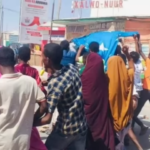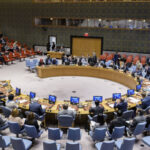
Somalia attack a wake-up call to the West
Another day, another attack in a far-flung, volatile land. Westerners are likely to react with a shrug and a sigh to the October 14 truck bombing in Somalia, the world’s deadliest attack on civilians in over a decade—if they heard about it at all. Yet the attack has direct implications for the United States and its allies.
Had a bombing that killed at least 358 people, injured 228 others, and left 56 missing taken place in the US or Europe, it would have mesmerized the Western public. But the reality is that the West has long been inured to tragedies in places they find unfamiliar, particularly ones like Somalia where misery seems the order of the day. The country on the Horn of Africa has suffered an array of seemingly insurmountable human-made and natural disasters over the past three decades, from protracted civil war and the rise of the Islamist armed group Al-Shabab to unrelenting drought and famine.
Although no one has claimed Saturday’s attack in the capital city of Mogadishu, the widespread assumption, including by the Somali government, is that Al-Shabab was responsible. Al-Shabab has carried out numerous attacks within Somalia and in neighboring Kenya and attracts fighters from the West, but it has not struck a Western country. That is perhaps another reason why Americans may think this attack has little or no relevance to the US.
There are several reasons why the US should take notice of the Somalia attack beyond the sheer horror of the carnage. Here are three of them:
First, some reports predict that US military involvement in Somalia may intensify as a result of Saturday’s attack. Already on October 16, the US launched another drone strike on alleged Al-Shabab targets outside Mogadishu. In March, President Trump designated Somalia a “zone of active hostilities” for lethal counterterrorism operations, allowing commanders — as a matter of US policy — to strike suspected Shabab fighters regardless of whether they posed an imminent threat to Americans, and relaxing certain protections against killing civilian bystanders.
US airstrikes and other use of force increased significantly in Somalia from June through September, with reports that one operation in late August resulted in a number of civilian deaths, including children. One newspaper reported that investigators in Somalia believe Saturday’s attack may partly have been a tit-for-tat for civilians killed in that August operation. The US has about 400 troops as well as dozens of trainers in Somalia—the largest US military deployment there in nearly 25 years.
If the US increases its use of force in Somalia, while loosening protections against killing bystanders, more civilians are likely to be killed. Wrongful killings of civilians carry the risk of generating more support for armed groups like Al-Shabab that are seeking to destabilize Somalia.
Second, the attack points to the need for Western nations to share responsibility for providing safe havens to those seeking protection from upheavals in their homelands, instead of unconscionably shutting doors on them. Domestic promoters of xenophobia and Islamophobia may falsely and recklessly spin the Somalia attack as evidence that Somalis, most of whom are Muslims, are somehow inherently dangerous.
That could generate support for President Trump’s efforts to indefinitely ban most people from Somalia and five other predominantly Muslim countries from entering the US. On October 17 and 18, two federal judges in Hawaii and Maryland temporarily blocked the Trump’s latest travel ban on the six countries but a separate lawsuit over the legality of the ban proceeds. The rulings did not block portions of Trump’s ban that would bar entry to North Koreans and loyalists of the autocratic president of Venezuela, in what critics call an attempt at “legal cover” for a ban primarily targeting Muslims.
Finally, the attack is a reminder that while Americans tend to think that Westerners are the primary targets of Islamist extremists, the vast majority of the victims of attacks by groups such as the Islamic State, Al-Qaeda, Boko Haram and Al-Shabab – including almost certainly those killed in Mogadishu on Saturday – are Muslims. The grief over those killed and injured in these despicable attacks from Pakistan to Iraq, Afghanistan and beyond is as profound as the grief in France, the UK, Spain, Germany, the US and other points West.
If the US does take further military action in Somalia, it should do its utmost to avoid harming civilians so that Somalis are not further victimized both by Al-Shabab and those fighting the group. If strikes go awry, the US should promptly investigate, publish its findings, and provide condolence payments and apologies regardless of fault; if strikes were unlawful, it should hold those responsible to account.
The US should press United Nations-supported African Union troops supporting the Somali government on the ground as well as the Somali troops it supports, who have repeatedly carried out serious laws-of-war violations, to also ensure redress for abuses they commit against civilians.
And rather than create more obstacles at home through measures such as the Trump travel ban, the US and its allies should take in eligible Somalis and other applicants, without discrimination on the basis of religion, after careful and appropriate screening.
Pushing policymakers to take these steps would do a lot more to help the Somali people and to deter support for Al-Shabab than simply shrugging and sighing.
Wararka xiga

Iiraan oo gaartay lix guul oo horleh weerarkii Yuhuuda

Yuhuuda oo qiratay in saldhig milatari iyo gego diyaaradeedba ku daayeen

Maraykanku ma ku dhacaa inuu weeraro Iiraan kadib weerarkii Yuhuuda?

Wadamada Kuwayd, Qadar oo Maraykanka u diiday

Iiraan oo maskaxiyan u dishay Yuhuuda xilli ayna far
Dhacdooyinka

Sucuudiga oo safar raali gelina ugu tagay dabadhilifka Yukrayn

Dhulbahante oo ugu dambeyn ku heshiiyay inay is xoreeyaan

Imaaraadka oo qirtey inay dhaceen maamulka Somalilaan

Nin gabdhaha daroogeeya kadibna muuqaal ka duubta oo la qabtey

Ruushka iyo Shiinaha oo noqday saaxiibka keliya ee Somaliya

Qadar oo koobka adduunka ka faaiidey dad badan oo diinta qaatay
